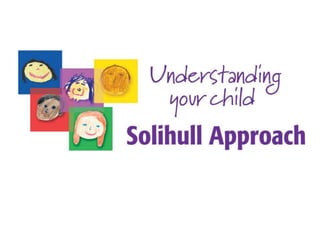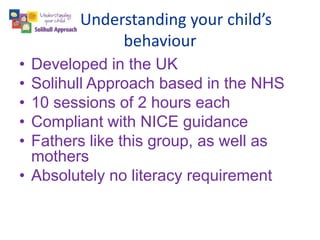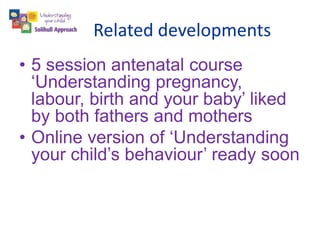Solihull Approach Panel
- 2. Unicef 2007 âĒ 1. Netherlands âĒ 2. Sweden âĒ 3. Denmark âĒ 4. Finland âĒ 5. Spain âĒ 6. Switzerland âĒ 7. Norway âĒ 8. Italy âĒ 9. Republic of Ireland âĒ 10. Belgium âĒ 11. Germany âĒ 12. Canada âĒ 13. Greece âĒ 14. Poland âĒ 15. Czech Republic âĒ 16. France âĒ 17. Portugal âĒ 18. Austria âĒ 19. Hungary âĒ 20. United States âĒ 21. United Kingdom âĒ Source: Unicef
- 3. Why are Dutch children happy? âĒ Paul Vangeert, professor of developmental psychology at the University of Groningen. âĒ The relationship that Dutch parents have with their children.
- 5. Why are relationship based courses important for promoting social inclusion? âĒ Children and young people more able to participate in society from a good relationship with their parent/s âĒ Optimal brain development (brain develops in the context of a relationship) âĒ Better language development âĒ Better social skills âĒ Hypothesis: Born nearer their genetic potential (mother already in a relationship with the baby in the womb less likely to smoke, drink alcohol, eat poorly with low vitamin uptake)
- 7. Understanding your childâs behaviour âĒ Developed in the UK âĒ Solihull Approach based in the NHS âĒ 10 sessions of 2 hours each âĒ Compliant with NICE guidance âĒ Fathers like this group, as well as mothers âĒ Absolutely no literacy requirement
- 9. Evidence âĒ RCTs are not the only research method âĒ Different research funding structure in USA and Australia make it easier to fund RCTs for American and Australian programmes âĒ Research funding for RCTs in the UK favours medical interventions âĒ The UK Treasury decided they liked RCTs âĒ The UK Treasury havenât released any more money to do RCTs! âĒ The Solihull Approach has a rich mix of quantitative and qualitative research studies
- 11. Related developments âĒ 5 session antenatal course âUnderstanding pregnancy, labour, birth and your babyâ liked by both fathers and mothers âĒ Online version of âUnderstanding your childâs behaviourâ ready soon












